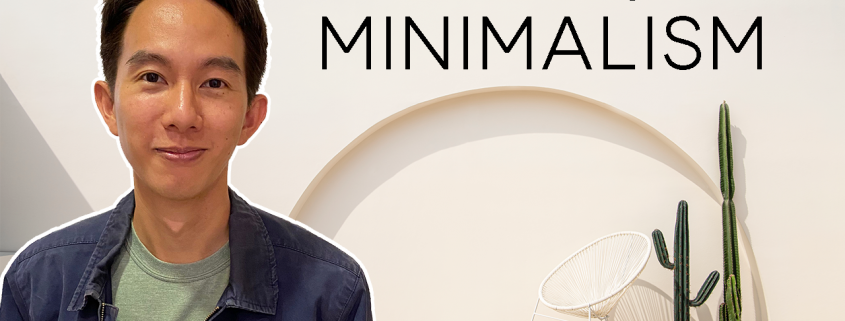What is Minimalism? (7 Practical Ways to Apply it in Your Life!)
Join our Telegram channel for more market analysis & trading tips: t.me/synapsetrading
Minimalism is a lifestyle and philosophy that emphasizes simplicity, minimalism, and mindfulness in all aspects of life.
It is a rejection of the materialistic, consumerist culture that is prevalent in many Western societies, and instead emphasizes the importance of living with intention and purpose.
In this blog post, I will cover all the benefits of this life philosophy, practical ways you can apply it in your life, and how it ties in with your spiritual development.
Table of Contents
Origins of Minimalism
The origins of minimalism can be traced back to the 1960s and 1970s, when a group of artists and writers began to reject the traditional, ornate styles that were popular at the time.
These artists and writers, who included figures such as Donald Judd and Sol LeWitt, instead embraced simplicity and purity of form in their work.
This led to the development of the minimalist movement, which sought to strip away the excesses of modern life and focus on what was truly essential.
Over time, the minimalist philosophy has spread beyond the realm of art and has become a popular lifestyle choice for many people.
Today, minimalism is embraced by people from all walks of life, who are drawn to its emphasis on simplicity, mindfulness, and intentionality.
Benefits of Minimalism
There are many benefits to adopting a minimalist lifestyle.
One of the biggest benefits is the feeling of freedom and liberation that comes from decluttering and simplifying your life.
By getting rid of excess possessions and obligations, you can free yourself from the burden of constant maintenance and upkeep.
This can provide a sense of relief and liberation, and can allow you to focus on what is truly important to you.
In addition to the psychological benefits of minimalism, there are also practical benefits.
For example, living a minimalist lifestyle can save you time and money.
By getting rid of excess possessions, you can reduce the amount of time and energy you spend on cleaning, organizing, and maintaining your belongings.
This can save you time and effort, and can allow you to spend your time and money on things that are truly meaningful to you.
Another benefit of minimalism is that it can help you to live a more sustainable and eco-friendly lifestyle.
By reducing your consumption and waste, you can reduce your impact on the environment and help to preserve natural resources for future generations.
This can be especially important in a world that is facing increasingly urgent environmental challenges.
How to Apply Minimalism in Your Life
If you are interested in adopting a minimalist lifestyle, there are many practical ways to do so. Here are some tips for applying minimalism in your life:
- Declutter your home: One of the first steps to adopting a minimalist lifestyle is to declutter your home and get rid of excess possessions that you no longer need or use. Start by going through each room in your home and getting rid of anything that you no longer need or use. This can include clothing, furniture, appliances, and other household items.
- Minimize your consumption: Another important step is to minimize your consumption and only purchase what you truly need and will use. This can involve making a shopping list and sticking to it, avoiding impulse purchases, and being selective about the products that you buy.
- Be mindful of the things that you already own: In addition to minimizing your consumption, it is also important to be mindful of the things that you already own. This means taking good care of your possessions and making sure that they last as long as possible. This can involve regular maintenance and repair, as well as being selective about the products that you use to clean and care for your belongings.
- Prioritize experiences over possessions: A key principle of minimalism is the idea that experiences are more important than possessions. Instead of focusing on acquiring more and more things, try to prioritize experiences that will enrich your life and provide lasting memories. This can include things like traveling, learning new skills, or spending time with loved ones.
- Simplify your daily routine: Another way to apply minimalism in your life is to simplify your daily routine. This can involve reducing the number of tasks and obligations that you have, and focusing on the things that are truly important to you. For example, you might prioritize spending time with loved ones, pursuing your hobbies and passions, or taking care of your health and wellbeing. By simplifying your daily routine, you can free up more time and energy for the things that matter most to you.
- Be mindful of your digital life: In today’s digital age, it is easy to become overwhelmed by the constant stream of information and distractions that are available online. To apply minimalism in your digital life, try to limit the amount of time that you spend on your devices, and be selective about the content that you consume. This can help to reduce the noise and distractions in your life, and can allow you to focus on the things that are truly important to you.
- Cultivate gratitude: Another important aspect of minimalism is the practice of gratitude. By cultivating gratitude, you can shift your focus away from the things that you lack, and instead appreciate the things that you already have. This can help to reduce feelings of dissatisfaction and discontent, and can help you to feel more content and satisfied with your life.
Minimalism & Spirituality
Minimalism and spirituality are two different, but related, concepts.
Minimalism is a lifestyle and philosophy that emphasizes simplicity, minimalism, and mindfulness in all aspects of life.
It is a rejection of the materialistic, consumerist culture that is prevalent in many Western societies, and instead emphasizes the importance of living with intention and purpose.
On the other hand, spirituality is a broad term that refers to the human search for meaning and connection with a higher power or the transcendent.
Spirituality can be expressed in many different ways, including through religious practices, meditation, and other forms of inner exploration.
Despite their differences, minimalism and spirituality are related in several key ways.
First, both minimalism and spirituality emphasize the importance of simplicity and mindfulness.
By focusing on the present moment and letting go of distractions and distractions, both minimalism and spirituality can help us to live more fully and authentically.
Second, both minimalism and spirituality encourage us to let go of excess possessions and attachments.
By getting rid of the things that we don’t need or use, we can free ourselves from the burden of constant maintenance and upkeep.
This can provide a sense of relief and liberation, and can allow us to focus on what is truly important to us.
Finally, both minimalism and spirituality can help us to connect with something greater than ourselves.
For some people, this might be a higher power or the transcendent.
For others, it might be a sense of connection with the natural world, or with a community of like-minded individuals.
In either case, minimalism and spirituality can both provide a sense of meaning and purpose in life.
Concluding Thoughts
Overall, minimalism is a lifestyle and philosophy that emphasizes simplicity, minimalism, and mindfulness in all aspects of life.
It can provide many benefits, including a feeling of freedom and liberation, practical savings of time and money, and a more sustainable and eco-friendly lifestyle.
By decluttering your home, minimizing your consumption, and being mindful of the things that you already own, you can begin to apply the principles of minimalism in your own life.
Now that I have shared what minimalism is about, and the practical ways you can apply it in your life, do you think this is a life philosophy which you will want to adopt?
For those already embracing this philosophy, what are some other ways which you have applied minimalism in your life?
Let me know in the comments below.

If you are excited to get more life hacks, also check out: “Beyond Financial Freedom: An Unofficial Guide to Living Your Best Life”
 Our flagship mentoring program is suitable for both beginners and advanced traders, covering the 4 strategies which I used over the past 15 years to build up my 7-figure personal trading portfolio.
Our flagship mentoring program is suitable for both beginners and advanced traders, covering the 4 strategies which I used over the past 15 years to build up my 7-figure personal trading portfolio.
 If you're looking for a reputable brokerage that covers all products (SG stocks, US stocks, global stocks, bonds, ETFs, REITs, forex, futures, crypto) and has one of the lowest commissions, this is what I currently use.
If you're looking for a reputable brokerage that covers all products (SG stocks, US stocks, global stocks, bonds, ETFs, REITs, forex, futures, crypto) and has one of the lowest commissions, this is what I currently use.
After trading for 18 years, reading 1500+ books, and mentoring 1000+ traders, I specialise in helping people improve their trading results, by using tested trading strategies, and making better decisions via decision science.






Leave a Reply
Want to join the discussion?Feel free to contribute!